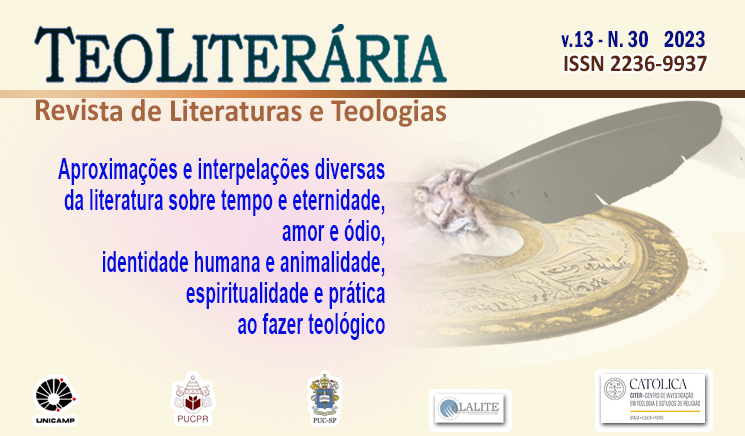Corpo na literatura sacro-erótica
um exemplo em Vita Nuova, de Dante Alighieri, e no testemunho da transverberação de Santa Teresa D’Ávila
DOI:
https://doi.org/10.23925/2236-9937.2023v30p138-161Palavras-chave:
misticismo, transverberação, Santa Teresa D’Ávila, Dante AlighieriResumo
A literatura medieval desenvolvida entre 1200 e 1350 e sua evolução subsequente revelou um período de grande riqueza de produção literária mística, de acordo com estudiosos da história da mística ocidental, como Bernard McGinn (1998). O período é altamente propício para uma investigação preliminar na qual a mística seja protagonista e, por este motivo, propomo-nos a estudar o conceito de erotismo espiritual em trechos de Vita Nuova (1292-1293), de Dante Alighieri (1265-1321), poeta, filósofo, político e grande nome da literatura italiana, e nos escritos de Santa Teresa D’Ávila (1515-1582), beata, autora de tratados, poemas e uma das mais importantes esposas místicas da Igreja Católica. Partimos da hipótese de que a carga erótica presente na experiência mística ultrapassa apenas um ideal de prazer corpóreo, mas apresenta, através do corpo, o início e os indícios da magnitude da experimentação espiritual. Para tanto, em Dante observaremos os efeitos dessa experiência mística no corpo, embasando-nos nos estudos de Agamben (2007), como conceito de amor como fantasma, Sturges (2012) e Santagata (2017), bem como exploraremos a temática mística e erótica de Santa Teresa através de seus próprios escritos a respeito do episódio de sua transverberação e dos tratados de Câmara (2020) e Alves (2019).
Referências
AGAMBEN, Giorgio. Estâncias - a palavra e o fantasma na cultura ocidental. Tradução de Selvino josé Assmann. Belo Horizonte: Editora UFMG, 2007.
ALIGHIERI, Dante. A Divina Comédia. Introdução, tradução e notas de Vasco Graça Moura. Edição bilíngue Italiano/Português. São Paulo: Editora Lamark, 2005.
ALIGHIERI, Dante. La Vita Nuova. A cura di Michele Barbi. Firenze: Società dantesca italiana, 1907.
ALIGHIERI, Dante. Vida Nova. Tradução dos originais Italiano e Latino por Carlos Eduardo Soveral. Terceira edição. Lisboa: Guimarães Editores, 1993.
ALVES, ALYSSON ZENILDO COSTA. TERESA DE ÁVILA: erotismo e experiência mística. In: IV Colóquio Internacional Estética e Existência. João Pessoa, Paraíba. Brasil, 2021. Disponível em: <https://www.doity.com.br/anais/esteticaeexistencia4/trabalho/141186>. Acesso em: 13 de abril de 2023
BARBER, Joseph A. The Role of the Other in Dante's “Vita Nuova”. In: Studies in Philology, v. 78, n. 2, 1981: 128-137.
BARTHES, Roland. Fragmentos de um discurso amoroso. Tradução de Hortênsia Santos. Rio de Janeiro: Francisco Alves, 1994.
BATAILLE, Georges. O Erotismo. Tradução de Antônio Carlos Viana. Porto Alegre: L&PM, 1987.
BÍBLIA. Português. Sagrada Bíblia Católica: Antigo e Novo Testamentos. Tradução de José Simão. São Paulo: Emunah, 2008.
CÂMARA. Yls Rabelo. Entre o Sacro e o Profano, entre o Gozo e o Interdito: a polêmica, prolífica e profícua Santa Teresa de Ávila. In: Revista Caracol, São Paulo, N. 21, 2021: 1120-1147
D’ÁVILA, Santa Teresa. O livro da vida. Tradução Marcelo Musa Cavallari. São Paulo: Penguin Companhia, 2010.
D’ÁVILA, Santa Teresa. Obras de Santa Teresa de Jesus. Tomo V. Opúsculos. São Paulo: Editora Vozes, 1951.
GUTIÉRREZ, Jorge Luis Rodríguez. A Filosofia Mística de Teresa de Ávila. In: Revista Caminhando, vol. 8, n. 1 [11], 2003: 127-157
JUNGBLUT, Ana Carolina. Amor e melancolia: obras da fantasia. In: Anais do Congresso Internacional da Faculdades EST. São Leopoldo: EST, v. 1, 2012: 1239-1253
LARGIER, Niklaus; BRETT, Jeremy. The logic of arousal: Saint Francis of Assisi, Teresa of Avila, and Thérèse Philosophe. In: Qui Parle, University of Nebraska Press, V. 13, n. 2, 2003.
MCGIN, Bernard. O florescer mística – Homens e mulheres da nova mística (1200-1350). São Paulo: Paulus, 2017.
MIRANDA FILHO, Mário. Nota sobre Eros em O banquete de Platão. In: Ide (São Paulo) [online], vol. 34, n. 52, 2011: 43-56. Disponível em < http://pepsic.bvsalud.org/scielo.php?script=sci_arttext&pid=S0101-31062011000100006 > acesso em 20 de março de 2021.
MIRCEA, Eliade. O sagrado e o profano. Tradução de Rogério Fernandes. São Paulo: Martins Fontes, 1992.
ORAZEM, Roberta Bacellar. Um importante modelo de santidade feminino contrarreformista: Santa Teresa D’Ávila e sua representação nas igrejas de associações de leigos carmelitas em Sergipe e Bahia colonial. In: Revista Brasileira de História das Religiões. Maringá, v. III, n. 9, 2011.
PAZ, Octavio. A dupla chama: amor e erotismo. São Paulo: Editora Siciliano, 1994.
PLATÃO. O banquete. In: Diálogos. (Os pensadores). Tradução José Cavalcante de Souza, Jorge Paleikat e João Cruz Costa. 1. Ed, São Paulo: Editora Globo, 1972.
QUATTROCCHI, Pietro. Erotismo. In: COMPAGNONI, Francesco et el. Dicionário de Teologia Moral. 1. ed. São Paulo: Paulus, 1997. p. 986-989.
SANTAGATA, Marco. Il poeta innamorato. Su Dante, Petrarca e la poesia amorosa medievale. Milano: Ugo Guanda, 2017.
STURGES, Robert S. Desire and devotion, vision and touch in the Vita Nuova. In: GRAGNOLATI, Manuele; KAY, Tristan; LOMBARDI, Elena; SOUTHERDEN, Francesca (org.). Desire in Dante and the Middle Ages. Nova Iorque: Modern Humanities Research Association and Routledge, 2012, p. 101-113.
SOUZA NUNES, Marcus Vinicius. Admoestações de São Francisco I-II: uma espiritualidade erótica. In: Revista Caminhos. Goiânia, v. 17, n. 1, 2019: 28-42
ZOLLA, ELÉMIRE. L’Amante invisibile: l’erotica sciamanica nelle religioni, nella letterattura e nella legittimazione politica. A cura di Grazia Manchiano. Marsilio Editore, 2018.
Publicado
Como Citar
Edição
Seção
Licença
Copyright (c) 2023 TEOLITERARIA - Revista de Literaturas e Teologias

Este trabalho está licenciado sob uma licença Creative Commons Attribution 4.0 International License.
A TeoLiterária – Revista de Literaturas e Teologias é detentora dos direitos autorais de todos os artigos publicados por ela. A reprodução total dos textos em outras publicações, ou para qualquer outro fim, por quaisquer meios, requer autorização por escrito do editor. Reproduções parciais de artigos (resumo, abstract, mais de 500 palavras de texto, tabelas, figuras e outras ilustrações) deverão ter permissão por escrito do editor e dos autores.



